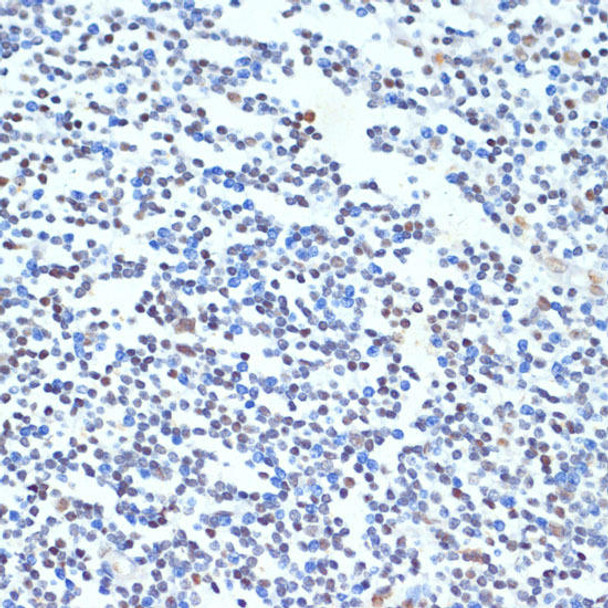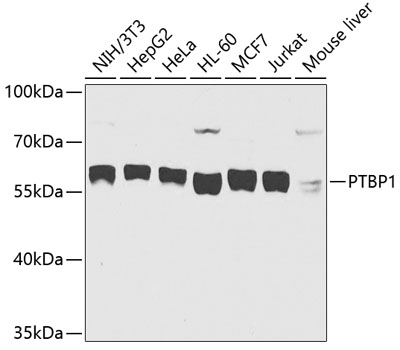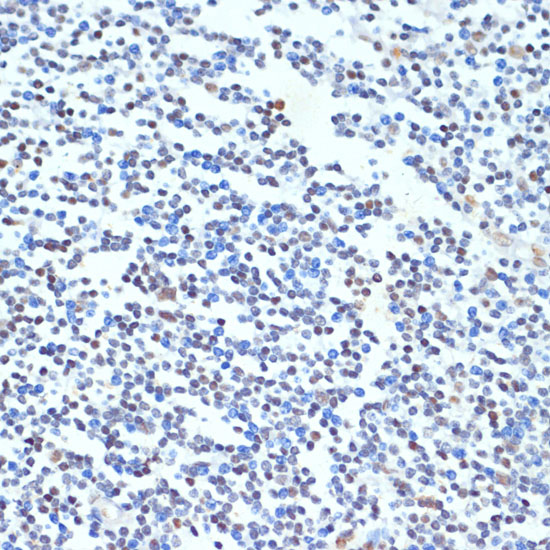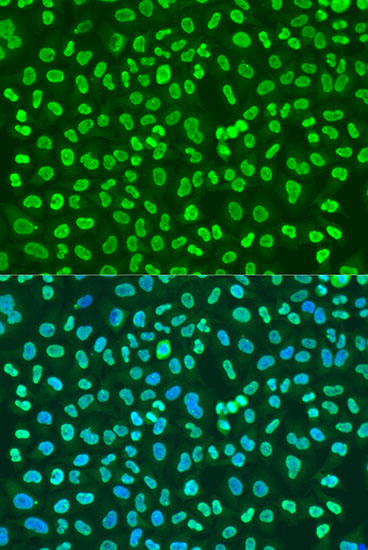Anti-PTBP1 Antibody (CAB6107)
- SKU:
- CAB6107
- Product type:
- Antibody
- Reactivity:
- Human
- Mouse
- Rat
- Host Species:
- Rabbit
- Isotype:
- IgG
- Antibody Type:
- Polyclonal Antibody
- Research Area:
- Epigenetics and Nuclear Signaling
Frequently bought together:
Description
| Antibody Name: | Anti-PTBP1 Antibody |
| Antibody SKU: | CAB6107 |
| Antibody Size: | 20uL, 50uL, 100uL |
| Application: | WB IHC IF |
| Reactivity: | Human, Mouse, Rat |
| Host Species: | Rabbit |
| Immunogen: | A synthetic peptide corresponding to a sequence within amino acids 1-100 of human PTBP1 (NP_114368.1). |
| Application: | WB IHC IF |
| Recommended Dilution: | WB 1:500 - 1:1000 IHC 1:100 - 1:200 IF 1:50 - 1:200 |
| Reactivity: | Human, Mouse, Rat |
| Positive Samples: | NIH/3T3, HepG2, HeLa, HL-60, MCF7, Jurkat, Mouse liver |
| Immunogen: | A synthetic peptide corresponding to a sequence within amino acids 1-100 of human PTBP1 (NP_114368.1). |
| Purification Method: | Affinity purification |
| Storage Buffer: | Store at -20°C. Avoid freeze / thaw cycles. Buffer: PBS with 0.02% sodium azide, 50% glycerol, pH7.3. |
| Isotype: | IgG |
| Sequence: | MDGI VPDI AVGT KRGS DELF STCV TNGP FIMS SNSA SAAN GNDS KKFK GDSR SAGV PSRV IHIR KLPI DVTE GEVI SLGL PFGK VTNL LMLK GKNQ AFIE |
| Gene ID: | 5725 |
| Uniprot: | P26599 |
| Cellular Location: | Nucleus |
| Calculated MW: | 57kDa/59kDa |
| Observed MW: | 57kDa |
| Synonyms: | PTBP1, HNRNP-I, HNRNPI, HNRPI, PTB, PTB-1, PTB-T, PTB2, PTB3, PTB4, pPTB |
| Background: | This gene belongs to the subfamily of ubiquitously expressed heterogeneous nuclear ribonucleoproteins (hnRNPs). The hnRNPs are RNA-binding proteins and they complex with heterogeneous nuclear RNA (hnRNA). These proteins are associated with pre-mRNAs in the nucleus and appear to influence pre-mRNA processing and other aspects of mRNA metabolism and transport. While all of the hnRNPs are present in the nucleus, some seem to shuttle between the nucleus and the cytoplasm. The hnRNP proteins have distinct nucleic acid binding properties. The protein encoded by this gene has four repeats of quasi-RNA recognition motif (RRM) domains that bind RNAs. This protein binds to the intronic polypyrimidine tracts that requires pre-mRNA splicing and acts via the protein degradation ubiquitin-proteasome pathway. It may also promote the binding of U2 snRNP to pre-mRNAs. This protein is localized in the nucleoplasm and it is also detected in the perinucleolar structure. Alternatively spliced transcript variants encoding different isoforms have been described. |
| UniProt Protein Function: | hnRNP I: a ubiquitously expressed heterogeneous nuclear ribonucleoprotein (hnRNP). hnRNPs are associated with pre-mRNAs in the nucleus and appear to influence pre-mRNA processing and other aspects of mRNA metabolism and transport. Binds to the polypyrimidine tract of introns. May promote the binding of U2 snRNP to pre-mRNA. Two alternatively spliced isoforms have been described. |
| UniProt Protein Details: | Protein type:RNA-binding; RNA splicing Chromosomal Location of Human Ortholog: 19p13.3 Cellular Component: nucleoplasm; membrane; nucleolus Molecular Function:protein binding; poly-pyrimidine tract binding; RNA binding; nucleotide binding Biological Process: nuclear mRNA splicing, via spliceosome; negative regulation of RNA splicing; negative regulation of nuclear mRNA splicing, via spliceosome; RNA splicing; negative regulation of muscle cell differentiation; gene expression; mRNA processing; regulation of alternative nuclear mRNA splicing, via spliceosome |
| NCBI Summary: | This gene belongs to the subfamily of ubiquitously expressed heterogeneous nuclear ribonucleoproteins (hnRNPs). The hnRNPs are RNA-binding proteins and they complex with heterogeneous nuclear RNA (hnRNA). These proteins are associated with pre-mRNAs in the nucleus and appear to influence pre-mRNA processing and other aspects of mRNA metabolism and transport. While all of the hnRNPs are present in the nucleus, some seem to shuttle between the nucleus and the cytoplasm. The hnRNP proteins have distinct nucleic acid binding properties. The protein encoded by this gene has four repeats of quasi-RNA recognition motif (RRM) domains that bind RNAs. This protein binds to the intronic polypyrimidine tracts that requires pre-mRNA splicing and acts via the protein degradation ubiquitin-proteasome pathway. It may also promote the binding of U2 snRNP to pre-mRNAs. This protein is localized in the nucleoplasm and it is also detected in the perinucleolar structure. Alternatively spliced transcript variants encoding different isoforms have been described. [provided by RefSeq, Jul 2008] |
| UniProt Code: | P26599 |
| NCBI GenInfo Identifier: | 131528 |
| NCBI Gene ID: | 5725 |
| NCBI Accession: | P26599.1 |
| UniProt Secondary Accession: | P26599,Q9BUQ0, |
| UniProt Related Accession: | P26599 |
| Molecular Weight: | 531 |
| NCBI Full Name: | Polypyrimidine tract-binding protein 1 |
| NCBI Synonym Full Names: | polypyrimidine tract binding protein 1 |
| NCBI Official Symbol: | PTBP1 |
| NCBI Official Synonym Symbols: | PTB; PTB2; PTB3; PTB4; pPTB; HNRPI; PTB-1; PTB-T; HNRNPI; HNRNP-I |
| NCBI Protein Information: | polypyrimidine tract-binding protein 1; hnRNP I; RNA-binding protein; 57 kDa RNA-binding protein PPTB-1; heterogeneous nuclear ribonucleoprotein I; heterogeneous nuclear ribonucleoprotein polypeptide I; polypyrimidine tract binding protein (heterogeneous |
| UniProt Protein Name: | Polypyrimidine tract-binding protein 1 |
| UniProt Synonym Protein Names: | 57 kDa RNA-binding protein PPTB-1; Heterogeneous nuclear ribonucleoprotein I; hnRNP I |
| Protein Family: | Polypyrimidine tract-binding protein |
| UniProt Gene Name: | PTBP1 |
| UniProt Entry Name: | PTBP1_HUMAN |







![Anti-PTBP1 Antibody (CAB18052)[KO Validated] Anti-PTBP1 Antibody (CAB18052)[KO Validated]](https://cdn11.bigcommerce.com/s-39x6lpnvxv/images/stencil/590x590/products/20930/19130/anti-ptbp1-antibody-cab18052ko-validated__08503__01686.1644252492.jpg?c=1)
![Anti-PTBP1 Antibody (CAB18084)[KO Validated] Anti-PTBP1 Antibody (CAB18084)[KO Validated]](https://cdn11.bigcommerce.com/s-39x6lpnvxv/images/stencil/590x590/products/20936/19136/anti-ptbp1-antibody-cab18084ko-validated__77554__34439.1644252493.jpg?c=1)

